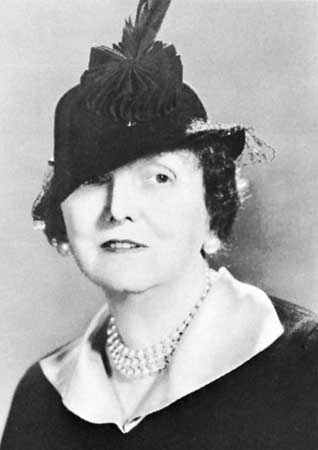etiquette
social norm
system of rules and conventions that regulate social and professional behaviour. In any social unit there are accepted rules of behaviour upheld and enforced by legal codes; there are also norms of behaviour mandated by custom and enforced by group pressure. An offender faces no formal trial or sentence for breach of etiquette; the penalty lies in the disapproval of other members of the group. Regardless of its level of material culture, any highly stratified society will possess an etiquette in which every person knows the behaviour expected from him toward others and from others toward himself.
The royal court was the natural home of etiquette, because it centred upon a monarch around whom niceties of behaviour spread in expanding circles. The author of Beowulf, writing of Anglo-Saxon society, describes Wealtheow the queen, “mindful of etiquette,” carrying the goblet first to the king, then to the courtiers, in a clearly defined order of precedence.
 The Middle Ages was a golden period for Western etiquette, since the feudal system was strictly stratified. Jean Froissart in his Chronicle speaks of the Black Prince waiting at table upon the captive king John of France, after the Battle of Poitiers.
The Middle Ages was a golden period for Western etiquette, since the feudal system was strictly stratified. Jean Froissart in his Chronicle speaks of the Black Prince waiting at table upon the captive king John of France, after the Battle of Poitiers. In Britain standards of conduct were greatly affected by the publication in the 16th century of certain Italian works known as courtesy books. Probably the most influential of these was Baldassare Castiglione's Il libro del cortegiano (1528; The Book of Courtesy, 1561). Further elaborations by English authorities—e.g., Richard Brathwaite's The English Gentleman and Description of a Good Wife—arrived in colonial America with passengers of the “Mayflower.” These British imports were soon followed by such indigenous products as the manual for parents entitled School of Good Manners (attributed to Eleazar Moody, 1715).
In Britain standards of conduct were greatly affected by the publication in the 16th century of certain Italian works known as courtesy books. Probably the most influential of these was Baldassare Castiglione's Il libro del cortegiano (1528; The Book of Courtesy, 1561). Further elaborations by English authorities—e.g., Richard Brathwaite's The English Gentleman and Description of a Good Wife—arrived in colonial America with passengers of the “Mayflower.” These British imports were soon followed by such indigenous products as the manual for parents entitled School of Good Manners (attributed to Eleazar Moody, 1715).The late 18th and early 19th centuries showed another great flowering of etiquette in Britain when exquisites like Beau Nash and Beau Brummell (Brummell, Beau) imposed their whims as rules upon polite society; even the Prince Regent would not leave his waistcoat unbuttoned to a greater degree than Brummell prescribed. In the late 19th and early 20th centuries those in the upper strata of society regarded the observance of the most trivial demands of etiquette as at once a diversion and, for the women, an occupation. More and more elaborate rituals were designed to create a sense of exclusiveness for the initiates and to keep the unworthy, ignorant of them, at a distance.
 By mid-20th century, however, concern about polite conduct was no longer confined to a social elite. Good manners for ordinary people in everyday situations were set forth in the United States by two prominent and influential arbiters of taste, Emily Post (Post, Emily) and Amy Vanderbilt (Vanderbilt, Amy). Drawing on her own wide experience in social, political, and diplomatic situations, no less a personage than Eleanor Roosevelt published her own typically practical Book of Common Sense Etiquette (1962).
By mid-20th century, however, concern about polite conduct was no longer confined to a social elite. Good manners for ordinary people in everyday situations were set forth in the United States by two prominent and influential arbiters of taste, Emily Post (Post, Emily) and Amy Vanderbilt (Vanderbilt, Amy). Drawing on her own wide experience in social, political, and diplomatic situations, no less a personage than Eleanor Roosevelt published her own typically practical Book of Common Sense Etiquette (1962).World wars and increasing social equality resulted in a simpler code, appropriate to the faster tempo and less pampered conditions of life in society. Nonetheless, etiquette remains active on royal or ceremonial occasions and in the more formal aspects of professional or communal life. No rule of law or principle of morality decrees that a soup plate should be tilted away from, never toward, the diner, or that (in Great Britain) a surgeon shall be known as “Mr.” while a physician is addressed as “Dr.,” but etiquette ordains it. Since the framework and content of the communities of which society is formed are constantly changing, the habits of etiquette can and do change with them.
- Perth and Kinross
- perthite
- Perthshire
- Pertinax, Publius Helvius
- Pertini, Alessandro
- Pertti Karppinen
- perturbation
- Peru
- Peru-Chile Trench
- Peru Current
- Peru, flag of
- Perugia
- Perugia, University of
- Perugino
- peruke
- Perun
- Perutz, Max Ferdinand
- Peruvian–Bolivian Confederation
- Peru, Viceroyalty of
- Peruzzi, Baldassarre
- Peruzzi Family
- Pervez Musharraf
- Pervomaysk
- Pervouralsk
- Perón, Eva